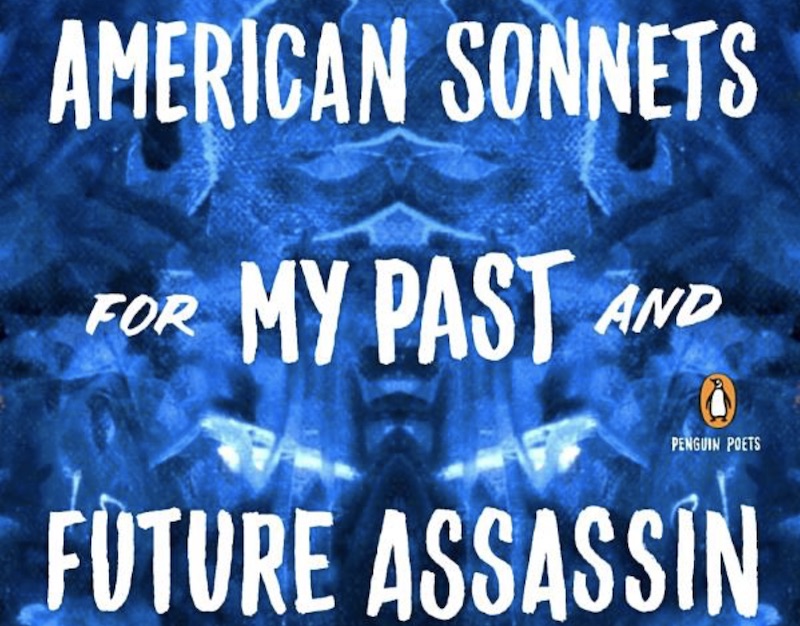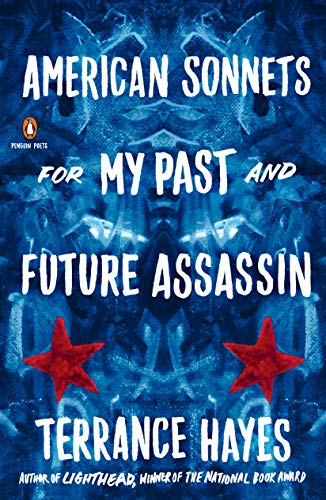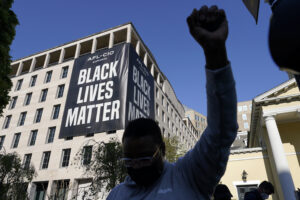Putting Trump to Shame Without Ever Saying His Name
Written after the 45th president was inaugurated, Terrance Hayes’ sonnets have an urgency that will leave readers’ heads spinning. Penguin Poets
Penguin Poets
“American Sonnets for My Past and Future Assassin”
A book by Terrance Hayes
“In a second I’ll tell you how little / Writing rescues,” writes Terrance Hayes in the opening poem of his most recent collection, “American Sonnets for My Past and Future Assassin.” Written in the days after Donald J. Trump was inaugurated as the 45th president of the United States, Hayes’ sonnets have an urgency and a potency that will leave readers’ heads spinning. And while it can be hard for this reader to be grateful for anything remotely related to Trump, I must say that if the anger he inspired erupted into poetry this powerful, I am thankful, at the very least, for Hayes’ verses.
Using Wanda Coleman’s revision of the 14-line form commonly reserved for romance, the author slashes open the all-American wounds of racism and sexism that never quite seem to heal. The point is not to salve them or save us through verse (remember, reader, this book isn’t about rescue), but to acknowledge the violent legacy that’s been eating our country alive since before the Constitution was even drafted.
Every one of the 65 poems in the book is titled “American Sonnet for My Past and Future Assassin,” as if assassination, which has played such a prominent role in our nation’s story, is Americans’ destiny. Certainly, for the speaker in the Hayes’ poems, violence in many forms, including murder, police brutality and suicide, is a daily reality that cannot be separated from any poetry that is truly labeled “American.” How can it be otherwise in a country where gun ownership is rampant and where, in 2018, a mass shooting took place on average once a day? This quotidian American violence is an even more common occurrence in the lives of people of color, who suffer additional harm from systemic racism embedded in the legal system as well as the national psyche. In a poem that explores the ideas behind the poetic form itself, Hayes points to other uniquely American phenomena: mass incarceration and Jim Crow laws.
“I lock you in an American sonnet that is part prison,
Part panic closet, a little room in a house set aflame.
… I make you both gym & crow here. …
I make you a box of darkness with a bird in its heart.
Voltas of acoustics, instinct & metaphor. It is not enough
To love you. It is not enough to want you destroyed.”
Hayes brings black icons from throughout U.S. history into his sonnets: James Baldwin, Nina Simone, Jimi Hendrix, Phillis Wheatley, Langston Hughes, Aretha Franklin, Toni Morrison and more, as if to remind all Americans as well as their leader: These are the greats that make up our shared history and you cannot erase them from the pages. Or, as he writes in another poem, “America’s struggle with itself / Has always had people like me at the heart of it.” Political figures, past and present, also make their way into the American sonnets—including Martin Luther King Jr. and Maxine Waters. Perhaps one of the most tender love poems in the book (which is paralleled only by a love ode to Baldwin’s face) is a sonnet about the 15-term member of Congress:
“Maxine Waters, being of fire, being of sword,
Shaped like a silver tongue. … I love your mouth,
Flood gate, storm door, you are black as the gap
In Baldwin’s teeth, you are black as a Baldwin speech.
I love how your blackness leaves them in the dark.
I love how even your sound-bite leaves a mark.”
The final rhyming iambic couplet becomes as memorable as one of Waters’ own phrases and imbues the words “blackness” and “dark” with power rather than the stigma white supremacy has historically drowned them in.
Click here to read long excerpts from “American Sonnets for My Past and Future Assassin” at Google Books.
Another naming ritual takes place in the collection’s pages. While it is a clear nod to the Black Lives Matter movement, which has emphasized the importance of saying the names of victims of police brutality and other forms of violence that people of color are disproportionately harmed by, a grief-fatigued Hayes chooses a different path. Rather than name “all the black people I’m tired of losing, / all the dead from parts of Florida, Ferguson, / Brooklyn, Charleston, Cleveland, Chicago,/ Baltimore, where the names alive are / Like the names in graves” the poet instead uses names to put a lyrical hex—“a pinch of serious poison,” “the opposite of a prayer”—on the many American assassins who have dug those graves such as the Charleston church shooter Dylann Roof and Trayvon Martin’s killer George Zimmerman.
Then there’s the name that looms large throughout the book, the one belonging to, as Harry Potter fans might call him, he-who-must-not-be-named. As if naming the 45th president would be a way of playing right into the hands of attention-seekers, Hayes instead either hints at the recognizable characteristics of the current occupant of the White House, or uses the words “trump” and “trumpet” in creative ways throughout his sonnets to call the U.S. leader out on his racism, sexism, lying—you name it. Take, for example, the poem that begins, “Are you not the color of this country’s current threat / advisory?” in which the poet proclaims of the president, “I know your shade. You are the color of a sucker punch.” In another poem, Hayes’ speaker demands, “Mister Trumpet what the fuck do you know.” In yet another, Hayes directly censures the president for his comments about women and Mexicans, speaking to him as one of the “assassins” all of his poems are dedicated to.
“…You
Are not allowed to say shit about Mexicans when you
Ain’t actually got any Mexican friends—bet you’ve never
Been invited to a family dinner. You ain’t allowed to deride
Women when you’ve never wept in front of a woman
That wasn’t your mother.”
The attacks on the marginalized that we’ve grown so accustomed to hearing spewed from the mouth of the U.S. leader are highlighted as anathema to the “family values” the right consistently claims to espouse. Hayes attributes his hateful rhetoric to his lack of understanding of friendship and family in the larger sense—the American collective family that is made up of so many cultures, including Mexican culture. In the same poem, Hayes struggles with the complicated national trajectory that led Americans from electing its first black president to voting for a man whom Ta-Nehisi Coates calls “the first white president.”
“Goddamn, so this is what it means to have a leader
You despise, the racists said when the president
Was black and I’ll be damned if I ain’t saying it too.
Is this a mandate for whiteness, virility, sovereignty,
Stupidity, an idiot’s threats & gangsta narcissisms threading
Every shabby sentence his trumpet constructs?”
The clever enjambment in the first lines marks the difference between the “leader” and “president” the nation had in Barack Obama, and the “mandate for whiteness” that has taken his place. As he grapples with the root of this choice, Hayes stumbles upon greed as one of the main explanations behind Trump’s election.
“America, you just wanted change is all, a return
To the kind of awe experienced after beholding a reign
Of gold. A leader whose metallic narcissism is a reflection
Of your own. … Like no
Culture before us, we relate the way the descendants
Of the raped relate to the descendants of their rapists.
May your restlessness come at last to rest, constituents
Of Midas. I wish you the opposite of what Neruda said
Of lemons. May all the gold you touch burn, rot & rust.”
The “rust” at the end of the poem harks back once again to the real estate magnate’s notorious orange-hued skin. Hayes’ comment on “the raped” and “the rapists” lays bare the despicable past of slavery—an institution that is the foundation not only of the United States as a country, but its glittering wealth as well. As Baldwin wrote, “For a very long time America prospered; this prosperity cost millions of people their lives.”
Perhaps the most powerful sonnet in the collection comes near the end of the book. It takes us back to Emmett Till’s brutal murder in Money, Mississippi, back further to Thomas Jefferson and Sally Hemings, and returns us to the present-day avarice, prejudice and fear that threatens to unravel our fragile union.
“Suppose you could speak nothing but money
And acrimony. … Suppose we cannot
Forget what happened in Money. Suppose
You’re someone who celebrates Thomas Jefferson’s
Birthday. Suppose he was someone whose love
For a black woman was blinded by blackness,
Hers & his, yours & mine. I ain’t mad at you,
Assassin. It’s not the bad people who are brave
I fear, it’s the good people who are afraid.”
It was precisely this “moral apathy, [this] death of the heart” that Baldwin said “terrified” him. And for good reason—it is very likely the American tragedy that will destroy us all.
Your support is crucial...
As we navigate an uncertain 2025, with a new administration questioning press freedoms, the risks are clear: our ability to report freely is under threat.
Your tax-deductible donation enables us to dig deeper, delivering fearless investigative reporting and analysis that exposes the reality beneath the headlines — without compromise.
Now is the time to take action. Stand with our courageous journalists. Donate today to protect a free press, uphold democracy and uncover the stories that need to be told.







You need to be a supporter to comment.
There are currently no responses to this article.
Be the first to respond.